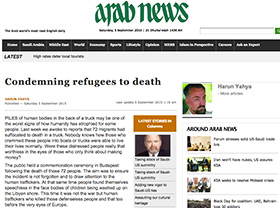
PILES of human bodies in the back of a truck may be one of the worst signs of how humanity has atrophied for some people. Last week we awoke to reports that 72 migrants had suffocated to death in a truck. Nobody knows how those who crammed these people into boats or trucks were able to live their lives normally. Were these distressed people really that worthless in the eyes of those who only think about making money?
The public held a commemoration ceremony in Budapest following the death of those 72 people. The aim was to ensure the incident is not forgotten and to draw attention to the human traffickers. At that same time people found themselves speechless in the face bodies of children being washed up on the Libyan shore. This time it was not the war but human traffickers who killed those defenseless people and that too before the very eyes of Europe.
Europe is facing the worst migrant crisis since the WWII and unfortunately, it is failing the test. Last year, Europe hit the headlines when it decided to cease helping refugees fighting for survival on the high seas. But now the refugee problem has become too great to permit such ruthless decisions to be taken. Last month, readers may recall, the 28 members of the EU struggled with each other to “not to” allow refugees in their countries. Members of the EU, with some of the world’s largest economies must be acting out of the idea that “the fewer the refugees there are, the better I will grow and protect my own line,” and regard sheltering large numbers of migrants as an ethical and economic burden.
The increasing number of people seek refuge in Europe has forced EU countries to take steps in this regard. The establishment of a camp for refugees on the Macedonian border in the wake of acts of violence along the border last week and the German decision to admit Syrian refugees and not to deport them are of course reasons to rejoice. However, Merkel has also issued a warning: “If we don’t succeed in fairly distributing refugees, then of course the Schengen question will be on the agenda for many,” she says. The Schengen agreement allows freedom of movement among most EU countries. These words may appear quite justified bearing in mind that most refugees and migrants seek to go to Germany. Yet one cannot refrain from asking, did Turkey, Jordan or Lebanon, which have currently admitted more than four million refugees, insist that they be fairly distributed among the countries of the Middle East? Of course, not. The people seeking shelter behind our borders are wretched people seeking to save their lives in the face of war. And we have a responsibility to take care of them for Allah’s approval. Contrary to what some Europeans think, we regard this as an opportunity to grow and improve ourselves and acquire depth.
Martin Schulz, head of the European Parliament, is one of the harsh critics of Europe’s refugee policy. It was Schulz who said, “Some Europeans are making a grave error as the Mediterranean turns into a mass grave.”
French Foreign Minister Laurent Fabius described some European countries’ refusal to accept refugees as a scandal. Fabius also criticized Hungary’s decision to put razor wire along the border to halt the flow of refugees as “incompatible with the values of the EU.” But what are those EU values? Are they based on growth and development, or on humanity? If humanity is more to the fore, then Europe should never have initiated this fight over refugees, which is surely a blot on its perceived reputation. Of course, we need to exclude some European politicians and most of the people of Europe from this. Many politicians have stood up for the refugees, and the people of Europe are making efforts to protect them. Although anti-migrant incidents have taken place in Germany, the great majority of people have condemned these, and thousands are known to have attended “welcome to refugees” activities.
Of course, the difference between migrants and refugees, which has been much discussed of late, needs to be considered. People fleeing wars and oppression and unable to return to their own countries are defined as refugees. These people are protected under international statute by a convention dating back to 1951 and cannot be forced to return home. Migrants, on the other hand, are people who are not persecuted in their own countries and who head to other countries in search of a better life. At this time of great upheaval, it is of course natural for countries to give refugees priority over migrants under these definitions. Indeed, the regulations in some European countries already ensure that. But when it comes to Europe, the position of the Balkan countries, which are sending on the greatest numbers of migrants, cannot be ignored.
The first stage in the resolution of this problem is to consider the requests on the part of some Balkan countries to speed up EU negotiations and for various measures to be adopted accordingly. Because what we want to see in Europe, is not countries wracked by poverty, but Europe growing and developing together. We must not forget that this is the true aim of the European Union.
There may be those who are thinking, “How can the EU possibly do all that?” The EU does have the means to do it. Anyone who is interested can have a look at Turkey, a country in a far weaker economic position as compared with many European countries and which has assumed the responsibility for taking care of all refugees’ needs. Such sacrifice would also return to European countries in the form of a fine moral value. Europe just needs the will to take some concrete measure to help these refugees.
Adnan Oktar's piece on Arab News:


